| 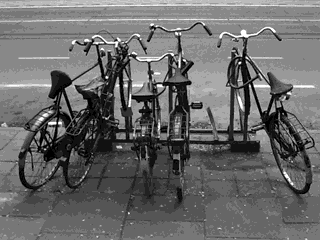
1 July 1996
Willem's Law Willem postulates that all bicycles weigh thirteen kilograms. A cheap bike weighs twelve kilograms and only needs small lock and chain--weighing perhaps a kilogram--to discourage thieves. On the other hand, an expensive lightweight four kilogram cycle requires some nine pounds of chains, clamps, locks, and other security devices to dissuade criminals and bored children. An extensive survey of Amsterdam provided no empirical evidence to refute Willem's hypothesis.
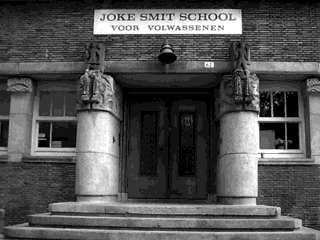
2 July 1996 Dutch Jokesmiths I never understood why the Dutch are so funny until Mirelle and Wim related the ordeal they suffered when their children applied for admission to the exclusive Joke Smit School (Jokesmith Academy). The application process was terribly arduous; Wim filled out a sheaf of application forms, some in duplicate, others in triplicate. Mirelle hired a consultant to provide advice on the best way to have her children admitted. In the end, both Wim and Mirelle agreed the interviews made the critical difference. By all accounts Rommert's examination was an unmitigated disaster. Upon walking before the three stern members of the Joke Smit School's senior faculty, he said "My arms are tired, I just flew in from Paris." (How could poor Rommert have known that all three members on the panel loathed the French?) One of the teachers broke the stone silence by asking Rommert if that remark was supposed to be a joke. "Not as big a joke as three fat old turds in a row." That was the wrong answer, that was the end of the appraisal, that was the end of Rommert's chances of ever being admitted to the Joke Smit School. Anneke, on the other hand, enjoyed spectacular success. For the riddle portion of the evaluation, she asked "What is orange and sounds like a parrot?" The three reviewers were atypically stumped, and one even let out a rare albeit weak chuckle when he heard the answer. ("A carrot.") When she knew that "Because God doesn't trust the buggers" was the correct answer to the obscure joke "Why doesn't the sun ever set on the British empire?" the triad were assured she had the makings of a scholar. She was in. Eight years of rigorous training in the Joke Smit School destroyed whatever humor Anneke once may have possessed, and by the time I met her she was as stern and sullen as her parents and brother. The Dutch are funny; have a workable solution to every problem. Perhaps the founders of the Jokesmith Academy got the idea from E. B. White: "Analyzing humor is like dissecting a frog. Few people are interested and the frog dies of it." The purpose of the Joke Smit School is to destroy a precocious child's latent sense of humor: that's hilarious!
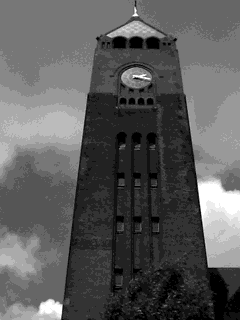
3 July 1996 How Late Is It? Frima told me the Dutch have an interesting concept of time. Instead of asking "What time is it?" they ask "How late is it?" That is the question, phrased perfectly.
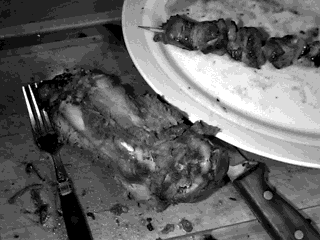
4 July 1996 Balkan Banquet Steve and Kelly are friends with a couple that emigrated from Belgrade with their daughter before they could be dragged into the bloody civil war that saw so many of their friends and neighbors maimed and killed. I met them when they brought over a small feast to thank Steve for building some book shelves in their apartment. They'd presented a leg of lamb, kebabs made with a variety of roasted meats, and lots of wine as "a Balkans barbecue." It was a memorable meal. The guests were utterly charming; I could have spent hours listening to them reading the telephone directory in their sonorous accents. I liked them; they were much more erudite and sapient than I'll ever be. Still, it will be a long time before I can think of the former Yugoslavia without seeing piles of meat. Visual associations are as strong as they are unpredictable.
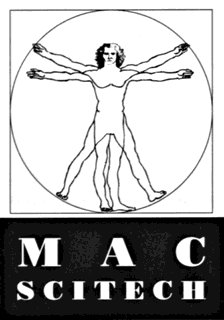
5 July 1996 Artless Science Vladimir Nabokov asked "Does there not exist a high ridge where the mountainside of 'scientific' knowledge joins the opposite slope of 'artistic' imagination?" I know that there is such a site; it's a good place to rendezvous with friends. I doubt that the spectacular view has been enjoyed by the "more than 1,500 scientists and engineers from medical, university, and manufacturing organizations" in the Macscitech association. The Macscitech logo says it all, really. First, there's the incredibly bad graphic design. Then there's the appalling typography: it looks like it was done by a nine year old child, except a nine year old would undoubtedly have chosen a better font. Most amazingly, they castrated the poor man in da Vinci's drawing. Ouch! It's no wonder people fear scientists.
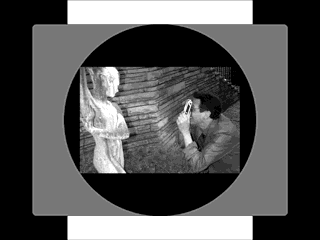
6 July 1996 Befuddled by Certain Ratios Today's task is to create work on the Internet from ideas that were once destined for a sheet of paper. The difficulties in this seemingly simple undertaking are exacerbated by very fundamental geometry problems. A "normal" sheet of North American paper is 8.5 inches by 11 inches, or a ratio of approximately 1:1.3. (Its 210 millimeter by 297 millimeter European counterpart, the alluringly named A4, is in the same neighborhood at a ratio of roughly 1:1.4.) Today's targets, though, are computer monitors with entirely different dimensions: 640 by 480 pixels, 832 by 624 pixels, et cetera, or a ratio of 4:3. The geometry is most perplexing. As A.D. Coleman nimbly demonstrates, the problem of fitting a rectangular peg in a round hole--the essence of photography--is relatively quite straightforward. Life goes on.
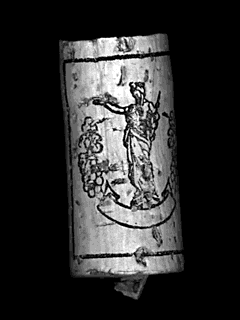
7 July 1996 A Quiet Evening at Home "Ah, zee night, eet ees steel young" he thought in Paris in 1927, in Albania in 1983. Leaving the world outside his apartment to manage its own affairs, he made a conscious decision to become more introspective. And then he noticed--in no particular order--zee wine bottle, zee knife, and zee glass. Zee knife was a small pedestrian knife of the sort one might use to peel an orange. It was protruding from his left forearm. Its insertion and subsequent severing of blood vessels had allowed a great deal of his blood to throb into a puddle on the floor. He quickly lost interest in his forearm after discovering the objects on the right to be more interesting. He scrutinized zee glass, which was empty. Lipstick merged with the dried wine on the rim. A small moistureless stain of wine occupied zee bottom of zee glass. But zee bottle, ah, zee bottle. Zee bottle was nearly full. "I've discovered a problem within a few inches of its solution!" he exclaimed. He was growing more optimistic by the day. Peripheral vision or a slight tingling again drew his attention to zee knife. "I must remove zee knife" he thought. He was very excited: he had found a second solution to a second problem--or was it the other way around? It was time for unequivocal action. He reached for zee bottle with his unsteady left arm. Zee knife flopped silently onto the floor. He steadied his hand, grasped the bottle, and poured wine to the top of the glass. A few drops of wine spilled over the rim and blended agreeably with the blood. He took a couple of small sips from the wine glass. His mind wandered. He pressed his wrist firmly against his chest even though he was almost done bleeding. He finished drinking zee glass of wine. He enjoyed the warm glow that comes both from wine and from achieving one's goals. He went to sleep listening with fascination to the radio's white noise static.
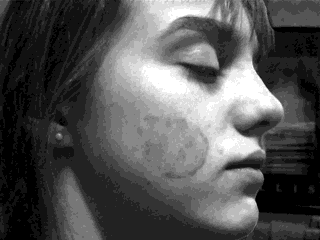
8 July 1996 Time and Photography I don't know what precipitated it, but I suddenly consciously realized the attraction of photography: I love the feeling of time rushing by. There are varying thicknesses of time between the viewer and the print; that's where the magic comes from. Sometimes the time is dense, almost opaque; there are miles and years of time between the eye and the print. Other times, there's no perceptible amount of time at all between the photograph and the viewer. In most of my favorite photographs there are both extremes, a pleasant topography.
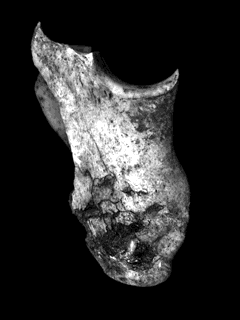
9 July 1996 Taken With a Grain of Sand The billions of stars that comprised the galaxy nearly stretched from one side of the inside wall of the grain of sand to the other. On a unique planet revolving around a nondescript sun, a small island of glass in a sea of toxins glistened in the grey sunlight. They sat alone in the middle of the tubular island, carefully studying a small, pink piece of bony meat, as they always had and always would. Near a tiny stain of dried blood, they recalled that an infinite number of true, one-dimensional lines can pass through a true point, which is nondimensional. After decades of inquiry, they noticed a fleck of sand protruding from a tendon. It was the clue they had been seeking.
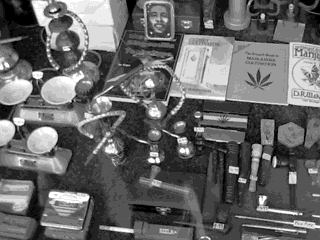
10 July 1996 Urbandale Legend James R. Trimble, a policeman in Urbandale, Iowa, was arrested last January after he was caught with a battery-operated "sexual device inserted into his body" while driving his car loaded with pornography, cocaine, LSD, marijuana, as well as some $20,000 worth of methamphetamine allegedly stolen from the police department's evidence. Despite Officer Trimble's expertise in the field of criminal behavior, this was far from the perfect crime. Truth, justice and the American way prevailed, and Trimble was fired, sentenced to probation, and fined $1,000. In addition, he was ordered by the court to perform one hundred hours of community service: lecturing schoolchildren about the perils of illegal drugs. It's a pity his audience will be limited to young students: I bet he has some first-hand accounts of drug abuse that would educate many an Iowa sophisticate.
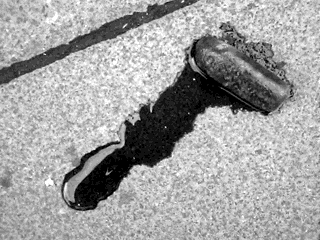
11 July 1996 Popsicle Art I've always admired the sight of a melted popsicle or melted ice cream. The sticky ghosts look like the chalk outlines of bodies at a crime scene. I've wanted to make a series of photographs of melted popsicles, ice cream cones, et cetera, but never have. Although I don't particularly like sweets, it paradoxically seems wrong to deliberately ruin something that's almost food. If nothing else, this reasoned inactivity represents perhaps my most successful attempt at rational procrastination.
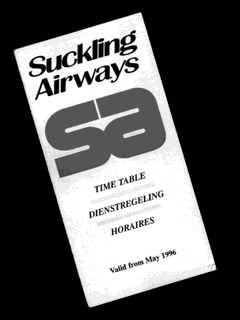
12 July 1996 Suckling Fraud I tried to get some free drinks in the exclusive Silver Suckling lounge at the Charles André Joseph Marie de Gaulle Airport in Paris, but I couldn't bluff my way past the receptionist. "I am sorry, monsieur," she said, "but you must have a Silver Suckling frequent flier executive membership card as well as a boarding pass for a Suckling Airways flight to enter." "I'm sorry," I replied, "but it would appear neither of us are frequent suckers." I could tell by her smile that she understood what I said, but she pretended to be confused. Of course, the Parisians always pretend not to understand any language except French. C'est la vie ...
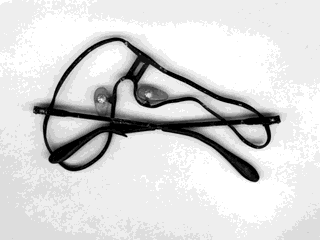
13 July 1996 Two-Dimensional Spectacles There's a training school near here--the John Knox Vocational Institute--where the unemployed learn to drive steam rollers. Of course, steamrollers were created to crush, flatten, and pulverize everything in their path. It would be a mistake, however, to view the steamroller solely as a destructive device. As with most technologies, those in control of the tools determine whether they're used constructively or destructively. The students at the John Knox Vocational Institute appreciate this distinction, and have created a small gallery of two-dimensional sculpture at the edge of the parking lot. That's where I found these and other lovely spectacles.
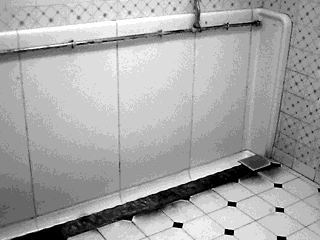
14 July 1996 Subtle Linguistic Differences I once made a series of photographs of English urinals. I was going to publish them as The British Urinals of Photography as an appropriate companion to a periodical called The British Journal of Photography. My plan was ruined, though, when I found that the Brits say yer-EYE-null, which doesn't rhyme at all with journal. I'm not too disappointed, though; The British Urinals of Photography never was a very good idea. The muse(s) work(s) in ways quite mysterious.
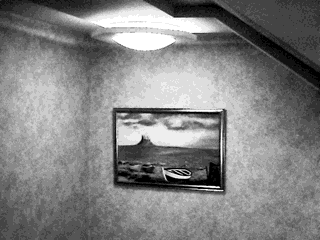
15 July 1996 Sponsorship Considerations I asked a manager in a large corporation why her company supported the arts when it seemed obvious none of her colleagues appreciated the arts. Most of the walls were bare, and the few paintings were mediocre copies of other mediocre paintings. "Why does a company that hates the arts give money to the arts?" she asked, rephrasing my question. "I don't know. Why do men who hate women give money to prostitutes?"
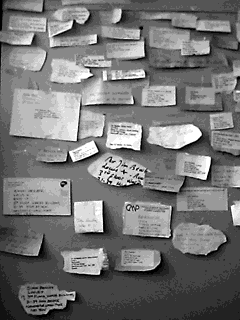
16 July 1996 Typos Galore Two friends of mine keep copies of all the correspondence they receive in which one of their names is misspelled. It's amazing how many ways there are to misspell John Bewley and Simon Herbart, almost as many as I've experienced with variations on Rhinehardt.
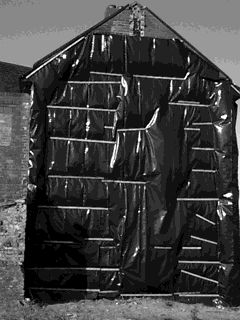
17 July 1996 Island One side of a building is entirely covered in black plastic punctuated by brilliant white boards. It's quite lovely on a sunny day. I suppose the covering intended as a temporary measure, but I hope it stays up until the monsoons come. An island of plastic in a sea of bricks is refreshing.
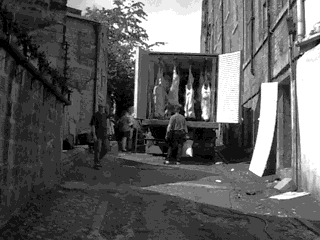
18 July 1996 What Tourists Do I was walking in a foreign country when I saw a film crew preparing to photograph a truck with four pig cadavers in a narrow alley. When I raised my camera to make a photograph, a man raised his hand in front of the lens and said "Excuse me!" "What do you mean?" I asked. "What are you doing?" he asked. "I am a tourist," I lied, emphasizing my foreign accent. "I am taking snapshots. That is what tourists do." The simpleton couldn't think of any response to an irrefutable universal truth, and silently walked away. I think he was probably working on one of those terrible made-for-television movies.
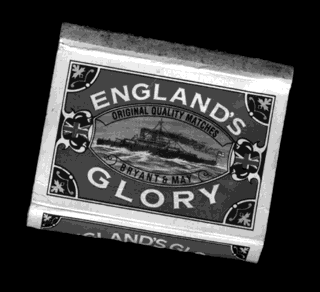
19 July 1996 England's Glory "England's Glory" matches are made in Sweden. Of course: all the English match manufacturing factories have closed. England's glory isn't what it used to be.
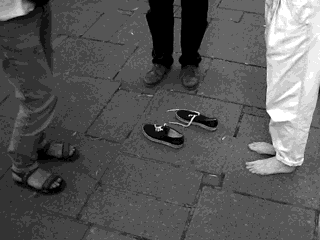
20 July 1996 Summer Shoe Practice When it's hot, you should either wear sandals, shoes and socks, or, go barefoot. Wearing shoes without socks is a formula for disaster (unless you're Italian.)
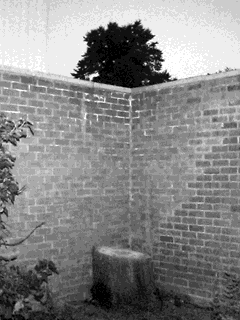
21 July 1996 The Man from M.I.C.L.O. Richard said he used the acronym MICLO--Masterly Inactivity and Cat-Like Observation--to describe his approach to practicing medicine. I was struck that his approach to his work is not unlike my own, even though it never occurred to me to express it in words, much less an acronym. Richard asked me why I was taking a photograph of the corner of his yard. I said I liked the image of a tree trunk at the bottom, tree leaves on the top, and nothing in the middle. Cat-like observation, really. Ironically, Richard and Paul don't have any cats.
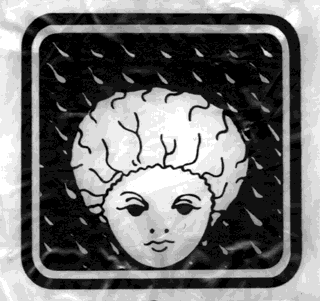
22 July 1996 The Temple of the Naïve The Temple of the Naïve's precepts are based on a passage from the Hebrew Scriptures: For thus saith the Lord God of Israel, The barrel of meal shall not waste, neither shall the cruse of oil fail, until the day that the Lord sendeth rain upon the earth.
--1 Kings 17:14 Temple members have interpreted this to mean that they'll do well until it rains. The crux of their belief is that the holy reference to "the Lord sendeth rain upon the earth" means that s/he'll literally shower them with brains. Thus, the Temple of the Naïve's scholars believe that they will continue to prosper as long as they remain ignorant, i.e., as long as they avoid a shower of brains. In the Temple of the Naïve, ignorance is bliss.
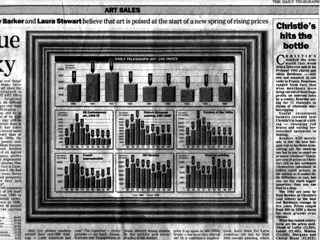
23 July 1996 Art Futures I always thought The Daily Telegraph was a crap newspaper, suitable only as a fish wrapping. Ironically, that's how I got the art page from yesterday's Telegraph: it was wrapped around an order of fish and chips. I think Man "All critics should be assassinated" Ray would have liked the Telegraph, for its arts page is all about money, not criticism. The publishers don't waste their time on obfuscated aesthetics, their focus is on the DT ART 100 --the Daily Telegraph Art 100 index. The DT ART 100 is a model of clarity and objectivity, right down to the nearest tenth of a percentage point. Yesterday's report shows that art has enjoyed "its brightest improvement in six difficult years--up 7.9 per cent from its December 1995 reading." Unlike the aloof critics at other periodicals, the Daily Telegraph reporters haven't lost touch with the real world: "Six years will have passed, next month, since Saddam Hussein rolled into Kuwait, doubled the world price of oil, halved worldwide company profits and made art a dispensable luxury ..." Daily Telegraph is bullish on the Old Masters--up 28.6 percent! The Surrealists are up just three-tenths of a point, less than the rate of inflation. (As anyone at Daily Telegraph will probably tell you, the surrealists always were a bunch of ne'er-do-wells.) "Contemporary Art" is also problematic: "... is confidence impossible in [Willem] de Kooning at $20.9m and [Jasper] Johns at $17m?" I'm afraid that, for me, confidence is impossible in the Daily Telegraph. Despite the spiffy three-dimensional graphs inside an ornate frame, I think the Telegraph analysts are, to use a polite American phrase, clue-free. For example, art in the "civilized" world was a "dispensable luxury" long before the Tigris tyrant was born. But wait, I'm falling into the trap of subjective analysis the Telegraph bean counters have so successfully avoided. If I am to criticize the Telegraph, I must do so on its terms, not mine. And so I will. Their arts page also features a piece on wine auctions at Christie's. Although I applaud the Telegraph editors for including wine on the arts page, once again their reporters are clueless when it comes to the real value of art. Christie's and the Telegraph are to the world of bacchanal art what Frederick's of Hollywood's Peek-a-Boo® nighties are to sex: pitiful albeit somewhat amusing irrelevancies. But enough verbiage, let's do the numbers. Last December I bought the wine I'm now drinking (Baron Umberto--one of Bulgaria's finest Cabernets) for $1.98. The same bottle is now trading at $2.69, an investment that has outpaced even The DT ART 100's Old Masters. I still think The Daily Telegraph is a crap newspaper. To give credit where it's due, though, I think it's fine for wrapping fish and chips.
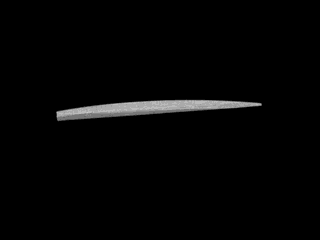
24 July 1996 Opening (Installation Description) Announce opening at a semi-traditional art gallery of a piece called "Opening." Serve an ocean of wine as well as one thousand small pieces of cheese impaled on one thousand toothpicks. Soak one of the toothpicks in LSD. (Depending on the venue, LSD may be a lemon saline dilution, licorice sugar dye, light salad detergent, et cetera.) Watch who gets the selected toothpick.
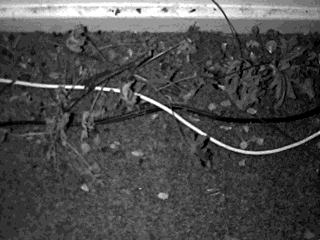
25 July 1996 The Ugly Side of Pretty Flowers are like dogs: they're fine as long as you keep them outside where they belong. Plants and puppies are a nuisance under a roof: they leak and shed everywhere. Everyone likes a pretty row of plants on a windowsill, but a glance at the dead leaves, dirt and dried blossoms on the floor beneath reveals their foul nature. It reminds me of photographing newborn harp seals on the ice floes off Newfoundland. The white furry seals are undeniably cute, but what's never shown in the photographs is that they leave a trail of feces behind them when they wiggle across the ice. Pretty always has an ugly side.
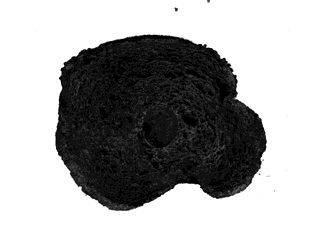
26 July 1996 The Pasta's Not Done The pasta's not done,
The pasta's not done,
The water is boiling,
But the pasta's not done The pasta's not done,
The pasta's not done,
The water is churning,
But the pasta's not done The pasta's not done,
The pasta's not done,
The water is roiling,
But the pasta's not done The pasta's not done,
The pasta's not done,
The garlic bread is burning,
But the pasta's not done The pasta's not done,
The pasta's not done,
The water is boiling,
But the pasta's not done The pasta's not done,
The pasta's not done,
The water is churning,
But the pasta's not done The pasta's not done,
The pasta's not done,
The water is roiling,
But the pasta's not done The pasta's not done,
The pasta's not done,
All the wine is gone,
But the pasta's not done
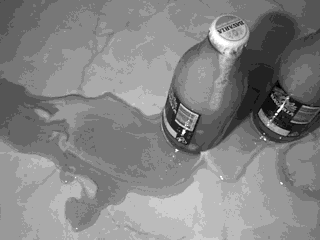
27 July 1996 Condensed Beer Last night some guests left a couple of beers in the freezer. They forgot about them in the fog from the other beer they drank, and I discovered them this afternoon when I went to put another beer in the freezer. The bottles were frozen solid, but they hadn't exploded. The pressure from the expanding liquid had loosened the caps, and each bottle was blessed with a little halo of frozen beer slush. I was pleasantly surprised they hadn't exploded as the beers of my youth did. I suppose that means that either the little bottles of Dutch beer have a greater structural integrity and/or more alcohol. (I suspect the former, as the beer in question was rather lame at only three percent alcohol.) The science became really interesting when I put the frozen bottles on a warm counter. The bottles started whining and whooshing, then they dribbled a steady stream of beer down the side. A person with an elementary grasp of physics would no doubt have understood why beer expands when it freezes as well as when it warms, but as a blissfully ignorant artist I just admired the mystery of my little icy volcanoes. Subsequent inquiries revealed that the liquid wasn't really beer, but the essence of beer. It was like beer syrup; it tasted like beer-flavored vodka. (No I'm not going to reveal whether or not I licked it off the counter: the artistic process must retain some aura of mystery.) I wonder if I can repeat the above process and go hiking with little vials of beer purée? The possibility adds a new dimension to the old beer vs. whiskey backpacking debates. On the domestic front, though, the moral of this story is clear: beer belongs in refrigerators; freezers are for film and vodka.
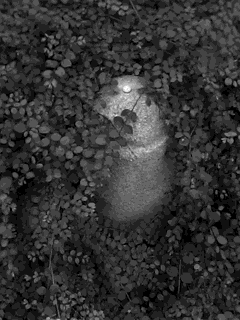
28 July 1996 Jock's Best Piece It's not surprising that Jock is well known for his photographs; he works hard making and distributing them. My favorite work of his, though, is his conceptual piece. (There's only one as far as I know.) Years ago Jock started leaving a five cent piece on the fire hydrant near his apartment. Sometimes the coin would remain for days, other times it would be gone within an hour. In recent years, Jock's started leaving quarters instead of nickels. They never stay there long; Jock suspects someone's aware of his practice and keeps the hydrant under surveillance. I worry that Jock's work may have been adversely affected by his success.
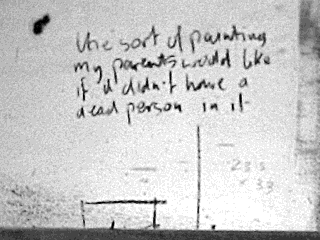
29 July 1996 Notice I saw an interesting note on the wall of an artist's studio: the sort of painting my parents would like if it didn't have a dead person in it I wasn't sure if that was the description of an existing work or the formula for a new one. I didn't ask since it didn't matter; the seventeen words were a complete piece.
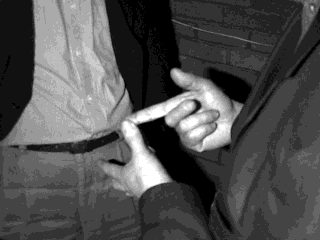
30 July 1996 Pointless Discussions I'm at a gathering of arts administrators, critics, and related sycophants. They've all been making lots of points for hours, but I'm becoming increasingly less interested. (Or that may have something to do with all the French wine I've had to drink with and after dinner.) I am reminded of Paul CÚzanne's observation: "It is sufficient to have a sense of art--and this sense is doubtless the horror of the bourgeois. Therefore institutions, pensions, honors can only be made for cretins, rogues, and rascals. Do not become an art critic, but paint; therein lies salvation." (Or that may have something to do with all the French wine I've had to drink with and after dinner.)
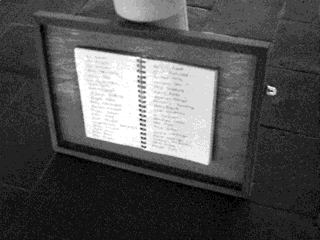
31 July 1996 More Art Fraud Harriet Hammer made her reputation by copying every name from the entire Manhattan phone directory in longhand. Her exhibits consisted of a couple of large sealed crates filled with the notebooks. (She could get away with that in the 1974.) It was only after her tragic death at a young age--killed by a drunk driver--that the executors of her estate discovered all the notebooks were blank except for two pages. I miss her.
last month | index | next month
©1996 David Glenn Rinehart |






























